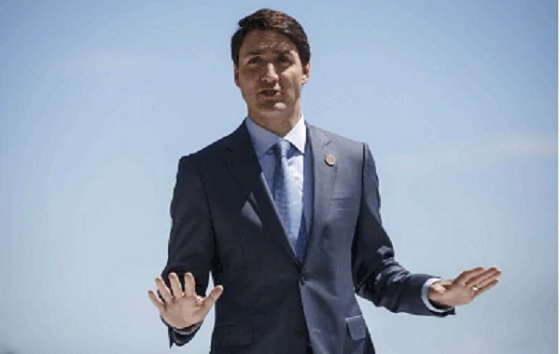Media
Trudeau’s Digital Services Tax threatens taxpayers and the economy

From the Canadian Taxpayers Federation
Author: Jay Goldberg
In other words, Trudeau is imposing a multi-billion-dollar tax on taxpayers – at a time when 50 per cent of Canadians say they’re $200 away from not being able to pay their bills.
Prime Minister Justin Trudeau managed to do two terrible things in one fell swoop: raise costs for Canadians at a time they can least afford it and risk a trade war with the United States.
The Trudeau government pushed its new Digital Services Tax through Parliament before quitting for the summer.
The government’s DST targets large foreign companies operating online marketplaces and social media platforms earning revenue from online advertising, such as Amazon, Facebook, Google and Airbnb. It is a three per cent tax on all revenue these companies generate in Canada.
Two red flags should pop up immediately for taxpayers. First, these companies won’t just eat the tax without passing costs onto consumers. And second, the United States government is sure to retaliate.
On the first point, there were clear signs that prices for Canadian consumers would increase because of this tax long before it was passed into law.
When the DST was in its proposal stage, the Parliamentary Budget Officer did an estimate of how much the government’s new tax would cost Canadians.
The PBO estimated the government’s DST would lead to an additional $7.2 billion in federal tax revenue over the next five years.
Where is that money coming from?
While major foreign companies will be the ones paying the tax directly, Canadian consumers will be hit with the bill.
It is “expected that businesses in the targeted sectors will adjust their services and prices in response to the new law,” the PBO said.
In other words, Trudeau is imposing a multi-billion-dollar tax on taxpayers – at a time when 50 per cent of Canadians say they’re $200 away from not being able to pay their bills.
Not only is Trudeau’s new DST going to increase costs for consumers, Canada also risks a trade war with the United States over the tax, which would cost Canadians even more.
In the wake of Trudeau’s DST getting through Parliament, the United States Trade Representative warned the U.S. will “do what’s necessary” to respond to the Trudeau’s new tax. USTR Katharine Tai warns she will look at “all available tools” as part of the U.S. response.
Tai’s isn’t the only voice in the U.S. calling for retaliatory action.
The Computer and Communications Industry Association, which represents tech companies like Amazon, Apple and Uber that will be targeted by Trudeau’s new tax, is calling on the Biden administration to fight back.
“With Canada’s DST now law, the time has come to announce [retaliatory] action,” said the association’s vice president, Jonathan McHale.
The president and CEO of the Tax Foundation is warning that U.S. retaliation would likely come through hiking tariffs on imports from Canada.
Given that the U.S. is by far Canada’s largest trading partner, making it more expensive to get Canadian goods into the American marketplace could have a detrimental impact on Canada’s economy, costing us both economic growth and jobs.
More than two years ago, the USTR warned against the Trudeau government taking measures that “single out American firms for taxation while effectively excluding national firms engaged in similar lines of business.”
But Trudeau chose to ignore those warnings and do exactly that.
To add insult to injury, the law authorizing the Trudeau government to bring the DST into effect (whenever it so chooses) allows it to do so retroactively, all the way back to 2022. Companies could be on the hook for huge sums for tax years in which the law didn’t even exist.
No wonder the Americans are threatening to fight back.
The bottom line is that Trudeau has put Canada in a terrible position. He is risking higher prices for Canadians and tariffs on our exports to the U.S. market, all in a lust for more cash. And the revenue the government is likely to bring in through the DST, an average of $1.4 billion a year, would be spent by this government in just one day.
It’s not too late for Trudeau to back down. Cabinet could choose not to bring the tax into force and avoid retaliation from the US.
For the good of taxpayers and the Canadian economy, Trudeau must abandon the DST.
Censorship Industrial Complex
Alberta senator wants to revive lapsed Trudeau internet censorship bill

From LifeSiteNews
Senator Kristopher Wells and other senators are ‘interested’ in reviving the controversial Online Harms Act legislation that was abandoned after the election call.
A recent Trudeau-appointed Canadian senator said that he and other “interested senators” want the current Liberal government of Prime Minister Mark Carney to revive a controversial Trudeau-era internet censorship bill that lapsed.
Kristopher Wells, appointed by former Prime Minister Justin Trudeau last year as a senator from Alberta, made the comments about reviving an internet censorship bill recently in the Senate.
“In the last Parliament, the government proposed important changes to the Criminal Code of Canada designed to strengthen penalties for hate crime offences,” he said of Bill C-63 that lapsed earlier this year after the federal election was called.
Bill C-63, or the Online Harms Act, was put forth under the guise of protecting children from exploitation online.
While protecting children is indeed a duty of the state, the bill included several measures that targeted vaguely defined “hate speech” infractions involving race, gender, and religion, among other categories. The proposal was thus blasted by many legal experts.
The Online Harms Act would have in essence censored legal internet content that the government thought “likely to foment detestation or vilification of an individual or group.” It would be up to the Canadian Human Rights Commission to investigate complaints.
Wells said that “Bill C-63 did not come to a vote in the other place and in the dying days of the last Parliament the government signaled it would be prioritizing other aspects of the bill.”
“I believe Canada must get tougher on hate and send a clear and unequivocal message that hate and extremism will never be tolerated in this country no matter who it targets,” he said.
Carney, as reported by LifeSiteNews, vowed to continue in Trudeau’s footsteps, promising even more legislation to crack down on lawful internet content.
Before the April 28 election call, the Liberals were pushing Bill C-63.
Wells asked if the current Carney government remains “committed to tabling legislation that will amend the Criminal Code as proposed in the previous Bill C-63 and will it commit to working with interested senators and community stakeholders to make the changes needed to ensure this important legislation is passed?”
Seasoned Senator Marc Gold replied that he is not in “a position to speculate” on whether a new bill would be brought forward.
Before Bill C-63, a similar law, Bill C-36, lapsed in 2021 due to that year’s general election.
As noted by LifeSiteNews, Wells has in the past advocated for closing Christian schools that refuse to violate their religious principles by accepting so-called Gay-Straight Alliance Clubs and spearheaded so-called “conversion therapy bans.”
Other internet censorship bills that have become law have yet to be fully implemented.
Last month, LifeSiteNews reported that former Minister of Environment Steven Guilbeault, known for his radical climate views, will be the person in charge of implementing Bill C-11, a controversial bill passed in 2023 that aims to censor legal internet content in Canada.
Business
Telegram founder Pavel Durov exposes crackdown on digital privacy in Tucker Carlson interview

From LifeSiteNews
By Robert Jones
Durov, who was detained in France in 2024, believes governments are seeking to dismantle personal freedoms.
Tucker Carlson has interviewed Telegram founder Pavel Durov, who remains under judicial restrictions in France nearly a year after a surprise arrest left him in solitary confinement for four days — without contact with his family, legal clarity, or access to his phone.
Durov, a Russian-born tech executive now based in Dubai, had arrived in Paris for a short tourist visit. Upon landing, he was arrested and accused of complicity in crimes committed by Telegram users — despite no evidence of personal wrongdoing and no prior contact from French authorities on the matter.
In the interview, Durov said Telegram has always complied with valid legal requests for IP addresses and other data, but that France never submitted any such requests — unlike other EU states.
Telegram has surpassed a billion users and over $500 million in profit without selling user data, and has notably refused to create government “backdoors” to its encryption. That refusal, Durov believes, may have triggered the incident.
READ: Arrest of Telegram founder Pavel Durov signals an increasing threat to digital freedom
French prosecutors issued public statements, an unusual move, at the time of his arrest, fueling speculation that the move was meant to send a message.
At present, Durov remains under “judicial supervision,” which limits his movement and business operations.
Carlson noted the irony of Durov’s situating by calling to mind that he was not arrested by Russian President Vladimir Putin but rather a Western democracy.
Former President of Russia Dmitry Medvedev has said that Durov should have stayed in Russia, and that he was mistaken in thinking that he would not have to cooperate with foreign security services.
Durov told Carlson that mandates for encryption “backdoors” endanger all users, not just suspects. Once created, such tools inevitably become accessible to hackers, foreign agents, and hostile regimes.
“In the US,” he commented, “you have a process that allows the government to actually force any engineer in any tech company to implement a backdoor and not tell anyone about it.”
READ: Does anyone believe Emmanuel Macron’s claim that Pavel Durov’s arrest was not political?
Durov also pointed to a recent French bill — which was ultimately defeated in the National Assembly — that would have required platforms to break encryptions on demand. A similar EU proposal is now under discussion, he noted.
Despite the persecution, Durov remains committed to Telegram’s model. “We monetize in ways that are consistent with our values,” he told Carlson. “We monetized without violating privacy.”
There is no clear timeline for a resolution of Durov’s case, which has raised serious questions about digital privacy, online freedom, and the limits of compliance for tech companies in the 21st century.
-

 Business1 day ago
Business1 day agoEU investigates major pornographic site over failure to protect children
-

 Health2 days ago
Health2 days agoRFK Jr. purges CDC vaccine panel, citing decades of ‘skewed science’
-

 Censorship Industrial Complex2 days ago
Censorship Industrial Complex2 days agoAlberta senator wants to revive lapsed Trudeau internet censorship bill
-

 Immigration2 days ago
Immigration2 days agoMass immigration can cause enormous shifts in local culture, national identity, and community cohesion
-

 Canadian Energy Centre1 day ago
Canadian Energy Centre1 day agoCross-Canada economic benefits of the proposed Northern Gateway Pipeline project
-

 Economy1 day ago
Economy1 day agoCarney’s Promise of Expediting Resource Projects Feels Like a Modern Version of the Wicked Stepmother from Disney’s Cinderella
-

 Alberta1 day ago
Alberta1 day agoAlbertans need clarity on prime minister’s incoherent energy policy
-

 Health2 days ago
Health2 days agoPolice are charging parents with felonies for not placing infants who died in sleep on their backs





